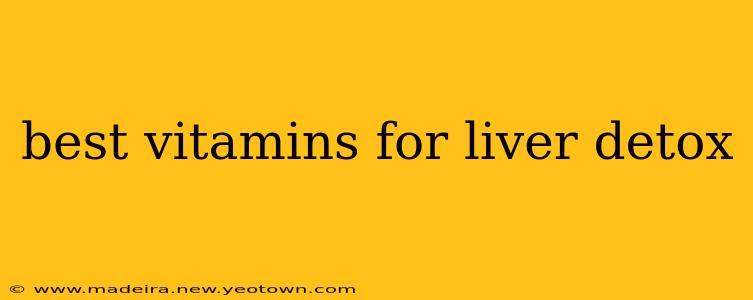Best Vitamins for Liver Detox: Supporting Your Body's Natural Cleansing Power
The liver, a powerhouse organ, works tirelessly to filter toxins from our blood. It's a true unsung hero, silently performing crucial functions that keep us healthy. But just like any hardworking organ, our liver can benefit from some extra support, particularly when we’re facing environmental toxins, a poor diet, or even the occasional indulgence. While there's no magic "liver detox" pill, certain vitamins and nutrients can significantly contribute to supporting its natural detoxification processes. This isn’t about a quick fix, but rather a holistic approach to liver health. Think of it as providing your liver with the tools it needs to perform its job effectively.
Let's explore some key vitamins that can play a vital role in supporting liver health and function:
What vitamins help the liver cleanse itself?
This is a question many people ask, and the answer isn't a single vitamin, but a combination of nutrients working synergistically. It's about optimizing the liver's natural ability to cleanse itself, rather than forcing a rapid "detox."
What are the best vitamins for liver repair?
Liver repair is a complex process, but certain vitamins can help. Focusing on supporting liver function is crucial, and these vitamins play key roles in that process:
-
Vitamin B12 (Cobalamin): Essential for cell growth and metabolism, including those in the liver. A deficiency can impact liver function, so ensuring adequate intake is important. Good sources include meat, poultry, fish, and dairy. For vegans and vegetarians, B12 supplements are often necessary.
-
Vitamin C (Ascorbic Acid): A powerful antioxidant, Vitamin C helps protect liver cells from damage caused by free radicals—unstable molecules that contribute to cellular aging and disease. Citrus fruits, berries, and leafy greens are excellent sources.
-
Vitamin E (Tocopherols): Another potent antioxidant, Vitamin E protects liver cells from oxidative stress. Nuts, seeds, and vegetable oils are good sources of Vitamin E.
-
Vitamin D: Recent research suggests a link between Vitamin D deficiency and non-alcoholic fatty liver disease (NAFLD). While the exact mechanism isn't fully understood, maintaining sufficient Vitamin D levels is advisable for overall liver health. Sunlight exposure and dietary sources like fatty fish contribute to Vitamin D levels.
Which vitamins are good for fatty liver?
Non-alcoholic fatty liver disease (NAFLD) is a significant concern, and a healthy lifestyle and diet are paramount in managing it. Certain vitamins might play a role in supporting a healthy liver in the context of NAFLD:
-
Choline: This essential nutrient is crucial for liver function and fat metabolism. It plays a vital role in preventing fat accumulation in the liver. Good dietary sources include eggs, liver, and soy products.
-
Milk Thistle (Silymarin): While not a vitamin, milk thistle is a potent herbal supplement that has shown promise in supporting liver health and potentially aiding in the regeneration of liver cells. Always consult a healthcare professional before taking milk thistle, especially if you have pre-existing health conditions.
Is it safe to take liver detox supplements?
While many liver detox supplements are marketed, it's crucial to proceed with caution. Always consult a doctor or registered dietitian before taking any supplements, especially if you have underlying health conditions. Some supplements can interact negatively with medications or exacerbate existing health issues. The focus should be on a healthy lifestyle, including a balanced diet and regular exercise, rather than solely relying on supplements.
Disclaimer: This information is for educational purposes only and does not constitute medical advice. Always consult a healthcare professional before making any changes to your diet or supplement regimen, particularly if you have a pre-existing medical condition. The information provided here is not a substitute for professional medical advice.

